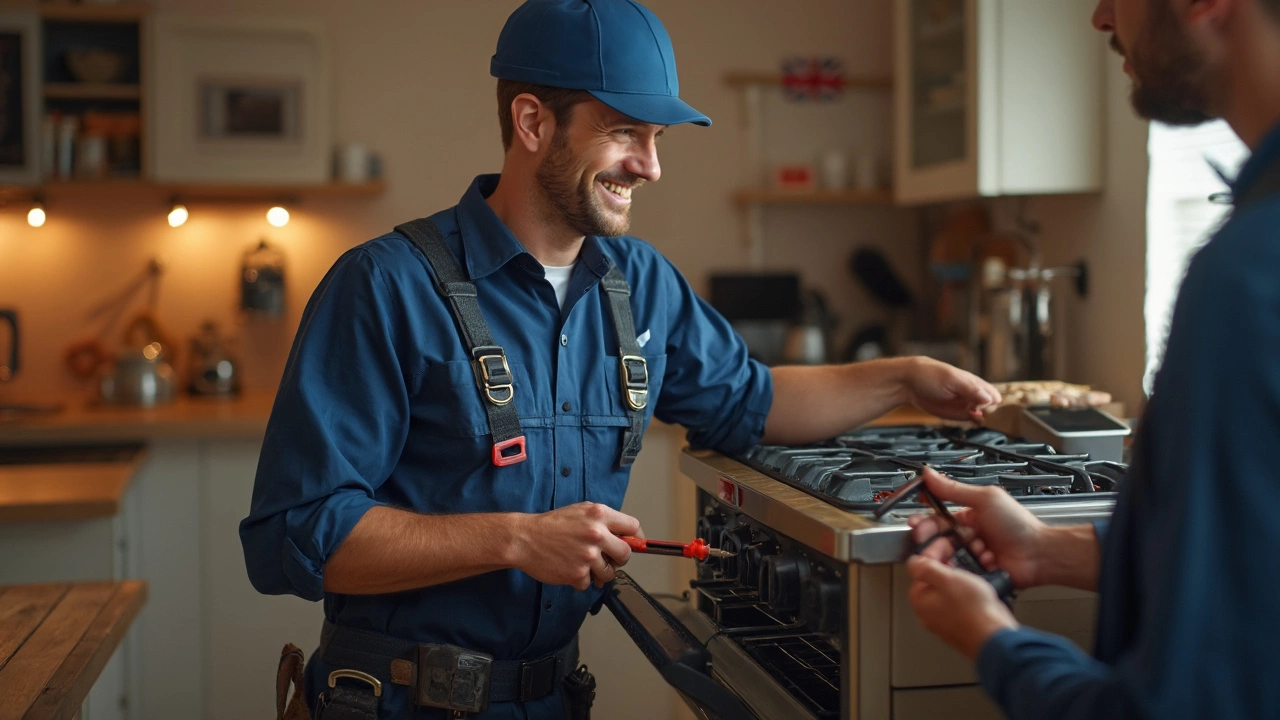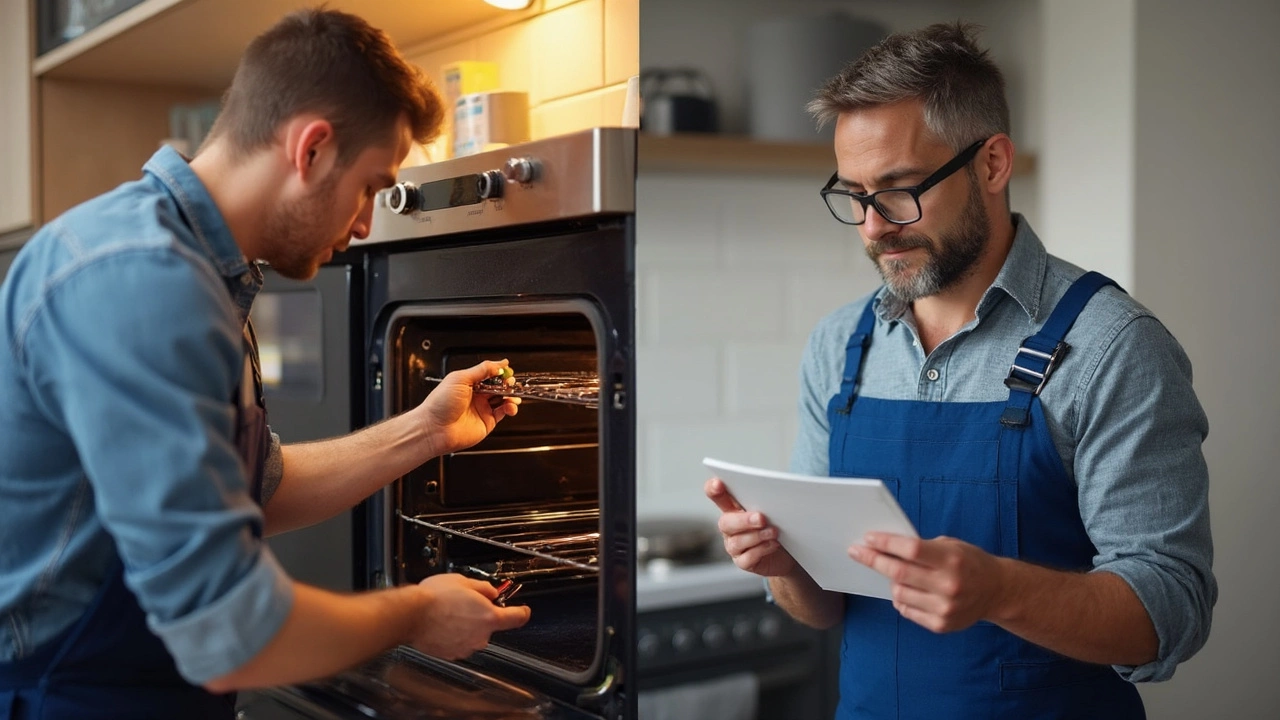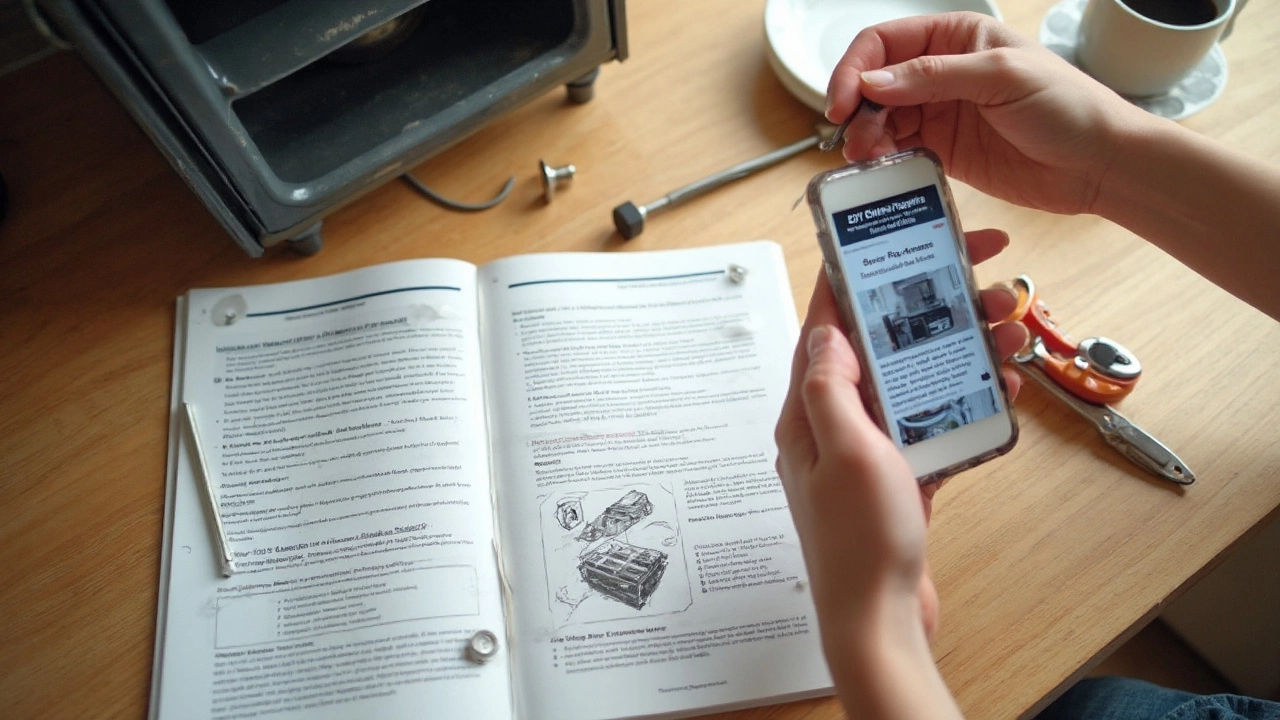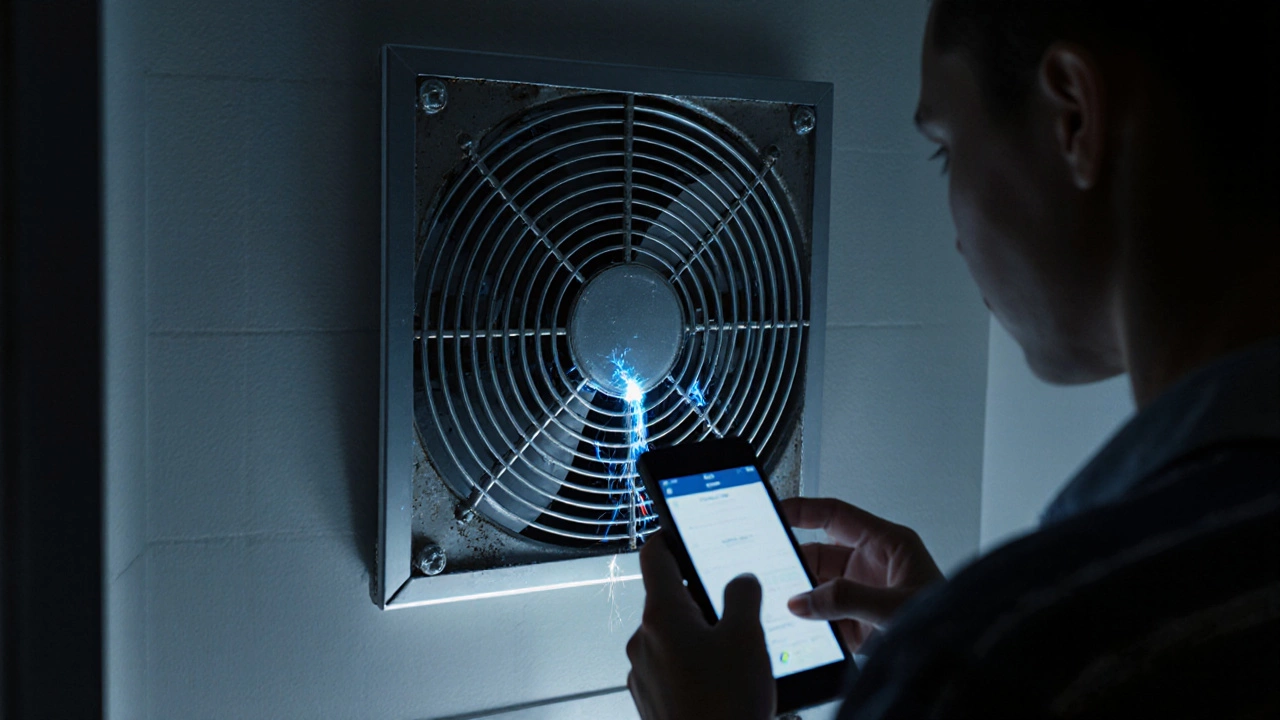
- 2 Jun 2025
- Gideon Thornton
- 0
If your electric oven suddenly dies in the middle of cooking, that sinking feeling is all too real. Most folks think of calling an electrician when any big electric appliance acts up, but not every oven problem falls under their toolbox.
Electricians are experts with wiring, circuits, and home electrical systems. If your oven won't power on, keeps tripping breakers, or sparks at the outlet, they're usually the person you want. They can quickly test if your oven is getting power, spot burnt wires, or fix blown fuses. These are the kind of jobs that can be risky to mess with yourself—I've seen people nearly fry themselves poking around the back of their oven without shutting off the breaker.
But here's a simple tip: before you call anyone, double-check that the oven is actually plugged in and that the outlet works with something else, like a toaster. Sometimes pets (my cat Whiskers has done this before!) or kids accidentally unplug stuff, and it's an easy fix.
- What Kinds of Oven Problems Can an Electrician Fix?
- When Do You Need a Specialist Instead?
- How Electricians Approach Oven Repairs
- Choosing the Right Help for Your Oven
- DIY Quick Checks Before Calling a Pro
What Kinds of Oven Problems Can an Electrician Fix?
Electricians are the go-to pros when your oven’s problems are related to electricity or wiring, not the cooking parts. These are the folks who know how to stay safe and get your power back on without guesswork. So, what issues can they actually tackle?
- Electricians can fix problems with oven power—like if it doesn’t turn on, keeps tripping the breaker, or has a dead display panel. They’ll figure out if the circuit is overloaded, the wiring’s burnt out, or the outlet is fried.
- If you smell anything burning or see smoke coming from behind or under your oven, electricians check the wiring for short circuits or melted insulation. Faulty wiring isn’t just annoying; it’s a serious fire risk.
- When you press a button and nothing happens—no lights, no sound, but the stove works—it’s often a sign of a faulty control board or loose connection. Electricians can test these with a multimeter and replace wires or connectors if needed.
- They can also handle blown fuses inside the oven, which can stop all functions dead in their tracks. And if your oven keeps tripping the house’s main breaker, that usually means it’s drawing too much current or has a short inside—another job for someone who knows what they’re doing.
It’s worth knowing that in a real survey by HomeAdvisor, about 42% of electric oven breakdowns come from electrical faults—not the heating element or timer itself.
| Common Issue | Can Electrician Fix? |
|---|---|
| Oven won't turn on | Yes |
| Breaker keeps tripping | Yes |
| Burnt wire smell | Yes |
| Faulty heating element | No (usually requires appliance tech) |
| Dead display/control panel | Yes |
| Broken door or knob | No |
Basically, if your problem has to do with current, breakers, or wires, electricians are your best bet. If it’s about broken knobs or the oven isn’t heating even though it’s plugged in, you might need someone else.
When Do You Need a Specialist Instead?
So, when does an electrician not cut it for electric oven repair? If the oven turns on and the lights work but it won't heat up or the temperature is all over the place, you probably need an appliance repair specialist instead. These pros know ovens inside and out, including how to fix or replace heating elements, thermostats, timers, and those fancy digital displays that just blink when they go bad.
Another clue: weird smells, grinding sounds from the fan, or if the door won't seal, point to oven-specific parts that electricians don’t typically handle. Modern ovens can have complex circuit boards or sensors, and messing with them without the right training risks turning that baked lasagna into a smoke show—possibly even starting a fire.
Here's a quick comparison of what electricians vs. appliance repair specialists usually tackle:
| Problem | Electrician | Oven Specialist |
|---|---|---|
| Oven won't power on | ✔️ | ❌ |
| Heater coil or element failure | ❌ | ✔️ |
| Faulty control panel | ❌ | ✔️ |
| Breaker keeps tripping | ✔️ | ❌ |
| Strange noises or smells | ❌ | ✔️ |
One interesting stat: Around 60% of electric oven failures relate to things like heating elements, sensors, or control boards—not the home wiring, according to a survey by the UK Domestic Appliance Industry Group in 2023. That’s a lot of work for appliance pros.
If your oven's issue is with things like uneven cooking, stuck doors, or wonky timers, skip the electrician and call a specialist. These folks often carry the right parts and can save you the headache of a repeat repair visit.

How Electricians Approach Oven Repairs
When it comes to electric oven repair, electricians have a pretty practical game plan. First, they always kill the power to the oven at the breaker—nobody wants a nasty shock. Next, they use a multimeter to check if power is actually reaching the oven. If the oven isn't getting juice, they troubleshoot the wiring and outlet, making sure no wires are loose or scorched. This step alone solves about 25% of oven power issues in a typical home, according to appliance repair surveys in 2024.
Once power checks out, electricians will look for obvious signs of trouble like burnt smells, scorched wires, or black marks near the connections. They know how to spot a shorted thermal fuse or a busted control board. Most modern electric ovens are packed with safety features, so electricians often check for a blown thermal fuse after a power surge.
- If the oven keeps tripping the breaker, they'll check for a ground fault or a faulty heating element.
- If the display panel is dead, they inspect the circuit board for burn spots or broken solder joints.
- For ovens with no heat, they test the bake and broil elements for continuity, replacing any that are open.
If the problem is with the home's wiring—like a faulty wall outlet or loose breaker—they have all the tools for a fix, including rewiring if it's needed. For fixes inside the oven itself, like replacing a heating element or repairing a control board, they'll only do it if it doesn't require special manufacturer tools or knowledge. That's usually covered by appliance techs, but a lot of electricians have crossover skills, especially in newer neighborhoods where everything has electric safety features.
| Step | What Gets Checked | Estimated Time Spent |
|---|---|---|
| Shut Off Power | Main breaker is switched off | 1-2 min |
| Test Power at Outlet | Multimeter test for voltage | 3-5 min |
| Inspect Wiring | Look for loose/burnt wires | 5-10 min |
| Test Components | Check fuses, elements, board | 10-20 min |
| Repair/Replace Parts | Install new parts or rewire | 15-40 min |
Electricians use every visit as a chance to check the safety of your oven setup. If they see something risky—like using the wrong outlet type or overloaded circuits—they’ll recommend an upgrade to prevent future breakdowns or even fires. Their main goal is not just getting your oven running, but making sure nothing else in your kitchen is at risk.
Choosing the Right Help for Your Oven
Picking the right person for your oven problem can save you money and a whole lot of hassle. Not every issue needs the same type of repair pro, and knowing who to call makes a real difference in how fast things get fixed.
First off, if your oven isn’t turning on or you see signs of trouble with the electrical side—think breakers tripping, no lights or sound, or the smell of burning wires—that’s a clear job for a electrician. They know how to handle high-voltage issues safely and deal with wiring inside your walls or breaker box. Fun fact: Over 30% of home appliance failures are due to electrical faults, so electricians see this stuff all the time.
On the other hand, if your oven turns on but doesn’t heat up, has uneven cooking, or buttons and displays aren’t working right, you might need an appliance repair tech instead. These folks really know their way around oven parts, heating elements, thermostats, and digital controls. Don’t waste cash calling the wrong person first just to get referred elsewhere.
- For no power, flickering lights, or burning smells: Call an electrician.
- For strange noises, erratic temperatures, or broken dials: Call an oven or appliance repair specialist.
Ask questions before booking anyone. Good pros should answer these honestly:
- Have you worked on my oven’s brand before?
- Do you charge a flat fee or by the hour?
- How quickly can you get replacement parts, if needed?
| Who to Call | Problem Type | Average Cost (USD) |
|---|---|---|
| Electrician | Power/wiring issues | $100 - $250 |
| Appliance Tech | Heating/cooking issues | $120 - $300 |
One more tip: Check if your oven is covered under warranty. If it is, a call to the manufacturer can get you a free or discounted repair and the right pro for the job. Always double-check before spending your own cash.

DIY Quick Checks Before Calling a Pro
No one wants to fork out cash for a visit when the fix could be super simple. Before you call an electrician for electric oven repair, run through these checks—you might save yourself some hassle and a decent chunk of change.
- Check the power: Make sure your oven is plugged in. It sounds basic, but a loose plug, nibbled cord (thanks, Whiskers!), or even an unseated plug can kill power.
- Test the outlet: Plug another small appliance, like a toaster or lamp, into the same outlet. If that doesn’t work, your outlet may be the culprit, not your oven.
- Look for tripped breakers: Head to your breaker box. If the breaker for the oven is flipped, reset it. Sometimes big ovens trip breakers if they’re overloaded or if there’s a short.
- Inspect for visible signs: Burn marks, odd smells, or melted spots around cords or on the oven itself are red flags. Don’t ignore these—they usually mean a bigger issue.
- Set the clock: Some modern ovens won’t start if the clock isn’t set after a power outage. Scroll through the settings—if you see a flashing clock, enter the current time and try again.
Here’s a quick look at how often these common issues crop up:
| Quick Check | Percent of Reported Oven Issues |
|---|---|
| Tripped breaker | 28% |
| Outlet or power supply problem | 17% |
| Unplugged oven/power cord issue | 11% |
| Clock not set | 6% |
| Visible damage | 4% |
According to Family Handyman,
"Simple electrical fixes—like resetting a breaker or making sure the outlet has power—can save you the cost of a service call."If these checks turn up nothing, that’s your cue to bring in a pro. It’s not worth the risk to dig further unless you really know your way around wiring and circuits.




